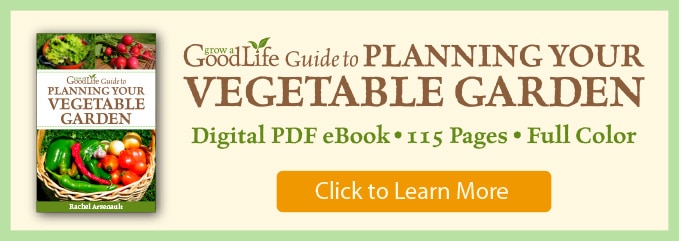How to Freeze Carrots
This post may contain affiliate links, which means that I may receive a commission if you make a purchase using these links. As an Amazon Associate I earn from qualifying purchases.
Freezing is one of the easiest ways to preserve a batch of carrots. Frozen carrots can be used all winter in soups, stews, stir-fries, and casseroles. Learn how to blanch and freeze carrots with this easy step-by-step guide.
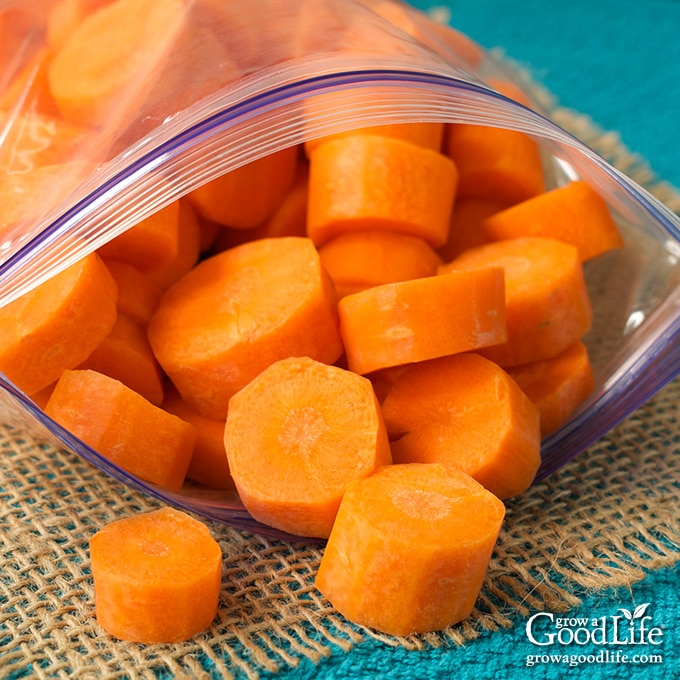
When it comes to fresh produce, carrots are one of the most versatile vegetables around. They can be enjoyed raw, boiled, roasted, or stir-fried. You can add carrots to soups, stews, casseroles, and puree them into smoothies. But what do you do if you have an abundant harvest, or find a great deal on carrots at the farmers’ market?
Go ahead and stock up! You can preserve carrots for up to a year by blanching and freezing.
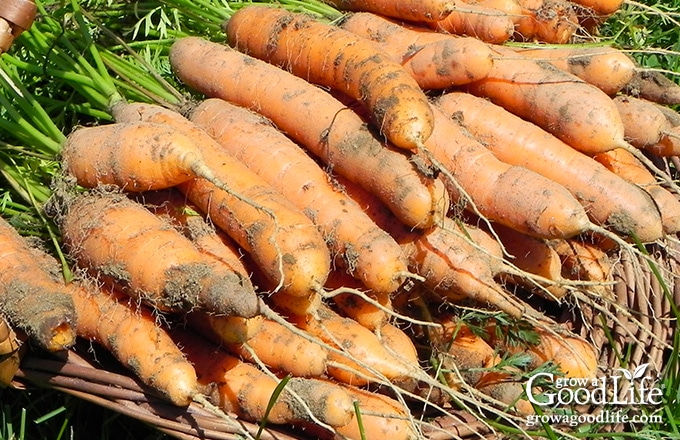
Tips for Freezing Carrots
Choose carrots that are fresh, firm, and healthy for freezing. If you are not able to preserve your carrots right away, trim off the greens, and store in the crisper drawer of your refrigerator for several weeks.
If you have never thought of freezing carrots before, you may have questions. Here are some tips and answers to frequently asked questions about freezing carrots:
Can you freeze carrots?
Yes, carrots are an excellent vegetable for freezing. They will last up to a year when blanched, preserved, packaged well, and stored in the freezer. The cold temperature reduces the growth of bacteria that causes produce to spoil.
Fresh carrots do last a long time in the crisper drawer of your refrigerator, but freezing them will help save space, and ensure that they will stay good for longer. Since they are already peeled and cut, frozen carrots can be a convenient way to add vegetables to your meals.
Why blanch carrots?
When you blanch food, you partially cook it in boiling water for a brief time, and then plunge it into an ice bath to stop the cooking process. The blanching process helps slow the enzymes that cause lost nutrients, flavor, color, and texture. It also washes off any bacteria that might be on the surface of the carrots. This will help the carrots taste good, and last longer in freezer storage.
Can you freeze raw carrots?
Yes, you can. They will not last as long, but if you are pressed for time, you can skip the blanching step and freeze raw carrots. You’ll need to use them within 3 months for the best quality. After that, the flavor and quality degrades. If you skip the blanching step, be sure to rinse and peel your carrots before freezing, and cook before eating to kill any bacteria that may be present.
If you want your carrots to last longer in the freezer, go ahead and blanch them before freezing. Properly blanched, packaged, and frozen carrots will maintain a higher quality for approximately 12 months.
Do I have to peel the carrots?
I know peeling carrots can be time consuming, especially when you are working with small carrots. Removing the peels before preserving reduces the surface bacteria that can cause spoilage even in the freezer. First wash the carrots well under clean running water, remove the skins with a vegetable peeler, and then rinse again before cutting and blanching.
Ways to Use Frozen Carrots
Having plenty of carrots in the freezer makes it so easy to prepare them for hot dishes. Carrots are the one vegetable that everyone in my household will eat. So I try to include it as a side dish on the table at most meals.
Keep the carrots frozen until you are ready to cook them. To use frozen carrots, just reach into the bag, grab what you need, and cook the way you like.
- Boiled Carrots: Place the frozen carrots into a small pot, fill with water, and bring to a boil over medium-high heat. Cook until tender, about 6-minutes, and season with salt, pepper, and butter.
- Oven Roasted Carrots: Frozen carrots are a great shortcut for making oven-roasted vegetables. Try this recipe: Rustic Roasted Root Vegetables
- Stews and Soups: Frozen carrots can also be used for making beef stew, and soups. Since they are partially cooked, add the carrots at the end, and heat until tender.
How to Freeze Carrots
A summarized, printable recipe can be found at the bottom of this article, but here are the illustrated steps to blanch and freeze carrots:
Step 1: Gather your equipment
Simple kitchen equipment is all you’ll need to freeze carrots. Gather the following kitchen gear, set up your work area, and prepare your carrots for freezing:
- Large pot
- Colander or mesh strainer
- 2 large prep bowls
- Vegetable peeler
- Knife
- Cutting board
- Slotted spoon
- Baking sheets
- Parchment paper
- Zipper type freezer bags, or freezer container of choice
- Kitchen towels
Step 2: Prepare the carrots
Cut off the greens, and scrub the carrots well under clean running water to remove dirt. Use a vegetable peeler to remove the peels. Trim the ends, and rinse the carrots again. Cut into 1/4-inch slices, cubes, or lengthwise strips. You can leave small carrots whole.
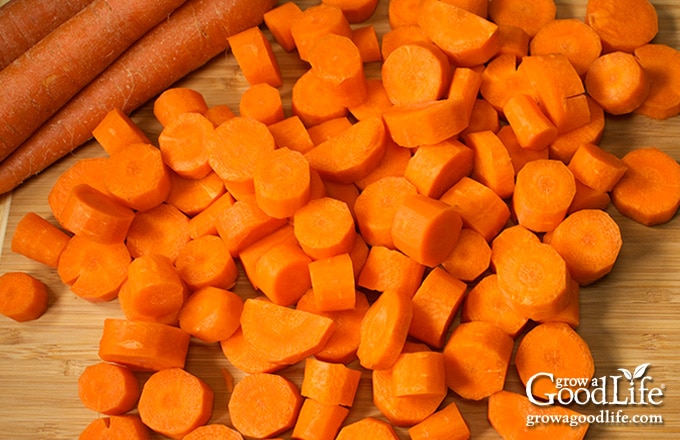
Step 3: Blanch the carrots
Bring a large pot of water to a rapid boil, and fill a large bowl with ice water.
Lower the prepared carrots into the boiling water, and blanch small whole carrots for 5-minutes, and boil carrot slices, 1/4-inch cubes, or strips, for 2-minutes. Work in batches to keep the water boiling at all times.
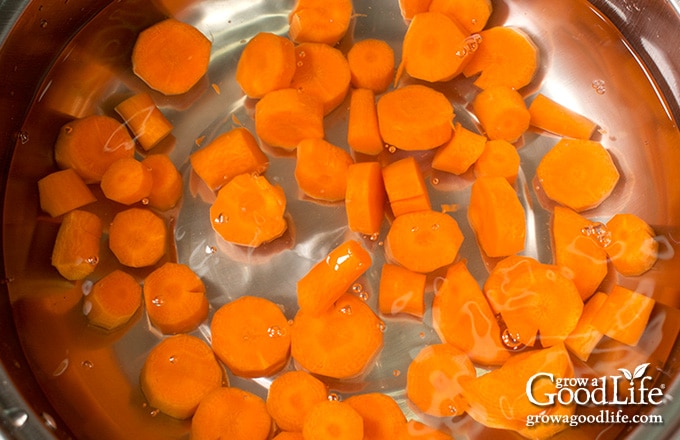
When the blanching time is complete, remove the carrots from the boiling water using a slotted spoon, and plunge into the bowl of ice water to cool for about 5 minutes. Once the carrots have cooled, scoop them out using the slotted spoon, and dry on a clean kitchen towel.
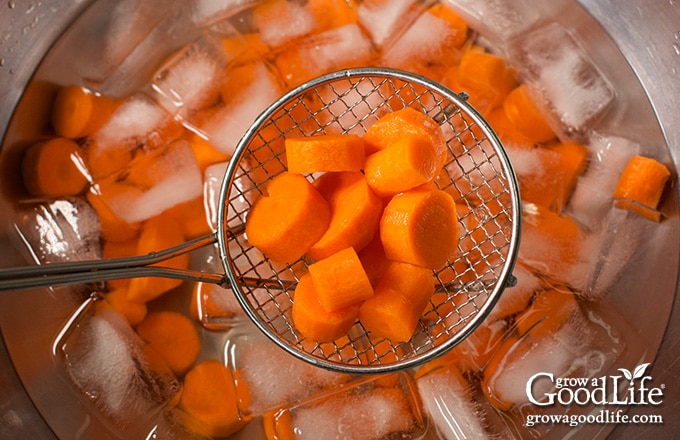
Step 4: Flash freeze the carrots
Flash freezing, also called tray-packing is the process of pre-freezing the carrots in a single layer on trays before storing in freezer bags. This helps prevent the pieces from sticking together, and will allow you to grab a handful when needed for meals.
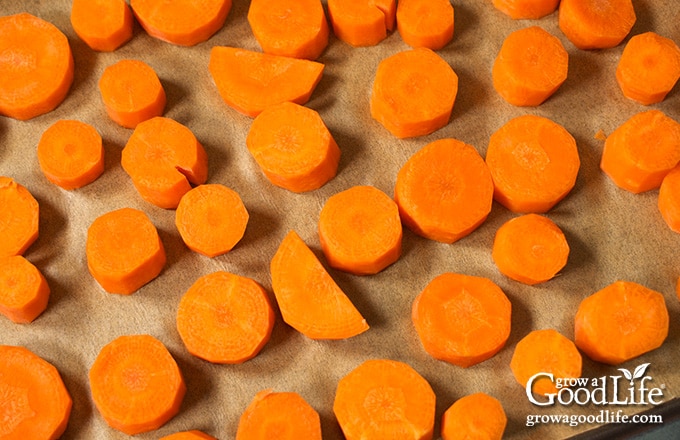
To flash freeze, layer your baking sheets with parchment paper. Spread the blanched carrots out on the lined baking sheet, so they are not touching. Place in the freezer, and freeze until the carrots are frozen solid, about 1-hour.
Don’t let the carrots stay on the trays for longer than 2-hours, or too much moisture will evaporate, giving the carrots a rubbery texture.
Step 5: Package into freezer bags
Place the frozen carrots into freezer bags, remove as much air as you can using a straw to prevent freezer burn, and seal the bag. Label, date, and store the carrots in the freezer until you are ready to use in your favorite recipes. Use within 12 months for the best quality.
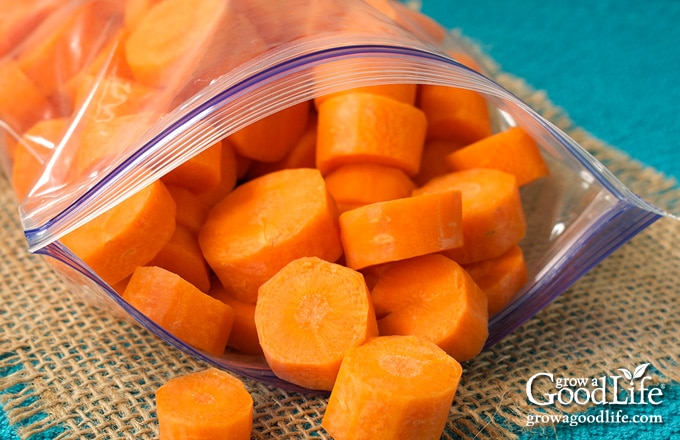
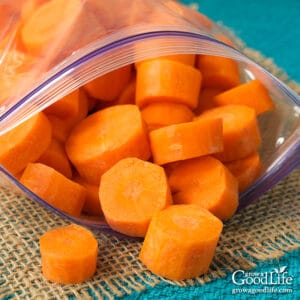
How to Freeze Carrots
Ingredients
- 4 pounds carrots
- water
- plenty of ice cubes
Instructions
- Cut off the tops and rinse the carrots well under running water, peel, trim off the ends, and rinse again.
- Trim the ends, and cut into 1/4-inch slices, cubes, or lengthwise strips. You can leave small carrots whole.
- Bring a large pot of water to a boil over high heat.
- Fill a large bowl with ice cubes and cold water.
- Once the water is boiling, add the prepared carrots and blanch small whole carrots for 5-minutes, and boil cut carrots for 2-minutes. Work in batches to keep the water boiling at all times.
- Remove the carrots with the slotted spoon, and plunge into the large bowl of ice water to cool for about 5 minutes.
- Once the carrots are cool, scoop them out of the ice water, drain, place them on a clean kitchen towel, and pat dry. Replenish ice as needed, and repeat with the remaining carrots.
- Layer several baking sheets with parchment paper, and spread the blanched carrots on the trays so they are not touching.
- Place the baking tray in the freezer and freeze until the carrots are frozen, about 1 to 2-hours.
- Transfer the frozen carrots to freezer bags, squeeze to remove air, and seal the bag. Label, date, and store in the freezer until ready to use in your favorite recipes. Freeze for up to 12 months at 0˚F or below. Yields about 2 quart-sized bags depending on the size of your pieces.
Nutrition
Freezing carrots is a great way to preserve them, and make your own homemade convenience food. Follow the steps above to blanch and freeze your carrots, and you will have them readily available to add to your favorite meals.
You May Also Like:
Good planning is key to a successful vegetable garden
Whether you are new to growing your own food or have been growing a vegetable garden for years, you will benefit from some planning each year. You will find everything you need to organize and plan your vegetable garden in my PDF eBook, Grow a Good Life Guide to Planning Your Vegetable Garden.

